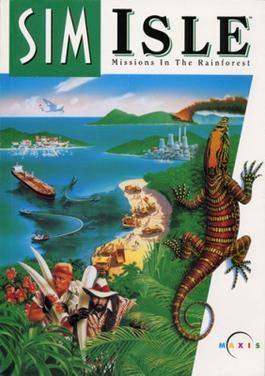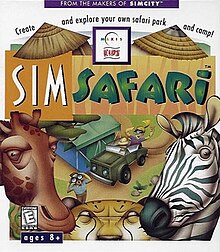
Maxis is an American video game developer and a division of Electronic Arts (EA). The studio was founded in 1987 by Will Wright and Jeff Braun, and acquired by Electronic Arts in 1997. Maxis is best known for its simulation games, including The Sims, Spore and SimCity.

SimCity is a city-building simulation video game developed by Will Wright, and released for several platforms from 1989 to 1991. SimCity features two-dimensional graphics and an overhead perspective. The game's objective is to create a city, develop residential and industrial areas, build infrastructure, and collect taxes for further city development. Importance is placed on increasing the population's standard of living, maintaining a balance between the different sectors, and monitoring the region's environmental situations to prevent the settlement from declining and going bankrupt.

SimCity 2000 is a city-building simulation video game jointly developed by Will Wright and Fred Haslam of Maxis. It is the successor to SimCity Classic and was released for Apple Macintosh and MS-DOS personal computers in 1993, after which it was released on many other platforms over the following years, such as the Sega Saturn and SNES game consoles in 1995 and the PlayStation in 1996.

SimFarm: SimCity's Country Cousin is a video game in which players build and manage a virtual farm. It was developed by Maxis and released in 1993 as a spin-off of SimCity. The game included a teacher's guide to teaching with SimFarm with blackline masters to be photocopied for the class and a user manual. In 1996, SimFarm and several other Maxis simulation games were rereleased under the Maxis Collector Series, with greater compatibility with Windows 95 and differing box art, including the addition of Classics beneath the title.

SimPark is a 1996 video game by Maxis. The object of the game is to cultivate and manage a successful park. Similar to SimTown, it is targeted more towards children than the average player. SimPark attempts to show the importance of ecological balance. It could well be considered a 'lite' version of SimIsle.

The Urbz: Sims in the City is a video game for the Game Boy Advance, GameCube, PlayStation 2, Xbox, and Nintendo DS. It is the third Sims game for video game consoles and is the second Sims game not to be released on Microsoft Windows, after a planned PC port and sequel were both cancelled due to mediocre sales. The next release for consoles and handhelds was the console port of The Sims 2.

Jurassic Park: Operation Genesis is a construction and management simulation video game based on the Jurassic Park series developed by Blue Tongue Entertainment and published by Universal Interactive, with the console versions being co-published with Konami in Japan. It was released for Windows, Xbox, and PlayStation 2. The game's primary goal is to construct a five-star rated dinosaur theme park named Jurassic Park on custom-generated islands by hatching dinosaurs, building attractions, keeping visitors entertained, and ensuring the park's safety.

SimsVille is a cancelled life simulation video game developed by Maxis. The game was conceived as a hybrid between the gameplay of The Sims, a social simulation game, and the city-building game SimCity. Development of SimsVille was undertaken over two years by the Maxis development team for SimCity in an attempt to expand The Sims franchise. Following delays to the game's release window, Maxis discontinued development of SimsVille in September 2001, citing concerns with the quality of the gameplay experience. Despite its cancellation, design elements of SimsVille would influence later Maxis products, such as the community features of The Sims: Hot Date and the integration of Sims into SimCity 4.

SimIsle: Missions in the Rainforest is a construction and management simulation game published by Maxis in 1995. Though it was not developed by Maxis, they still referred to it as a "software toy" instead of a "video game" because it remained faithful to the philosophy of the company.

Theme Park World, also known as Theme Park 2, and in North America as Sim Theme Park, is a 1999 construction and management simulation game developed by Bullfrog Productions and released by Electronic Arts. The direct sequel to Theme Park, the player constructs and manages an amusement park with the aim of making profit and keeping visitors happy. Initially developed for Windows, it was ported to PlayStation and PlayStation 2, as well for Macintosh computers. The Mac version was published by Feral Interactive.

Theme Park Inc. is a construction and management simulation video game. It is the sequel to Theme Park World (1999). Theme Park Inc. was developed by Bullfrog Productions and published by Electronic Arts. It was the last game to bear the Bullfrog logo before the company's merger with EA UK in 2004.
SimCity is an open-ended city-building video game franchise originally designed by Will Wright. The first game in the series, SimCity, was published by Maxis in 1989 and was followed by several sequels and many other spin-off Sim titles, including 2000's The Sims, which itself became a best-selling computer game and franchise. Maxis developed the series independently until 1997, and continued under the ownership of Electronic Arts until 2003. EA commissioned various spinoffs from other companies during the 2000s, focusing on console and mobile releases. A 2013 EA-Maxis reboot was subject to what has been described as "one of the most disastrous launches in history", which may have triggered the 2015 shutdown of Maxis Emeryville and the end of the franchise.

SimCity is a city-building and urban planning simulation massively multiplayer online game developed by Maxis Emeryville and published by Electronic Arts. Released for Microsoft Windows in early March 2013, it is a reboot of the SimCity series, and is the first major installment since the release of SimCity 4 a decade before. A macOS version was released on August 29, 2013.
Construction and management simulation (CMS), sometimes also called management sim or building sim, is a subgenre of simulation game in which players build, expand or manage fictional communities or projects with limited resources. Strategy video games sometimes incorporate CMS aspects into their game economy, as players must manage resources while expanding their project. Pure CMS games differ from strategy games, however, in that "the player's goal is not to defeat an enemy, but to build something within the context of an ongoing process." Games in this category are sometimes also called "management games".

SimCity Creator is a city-building game for the Nintendo DS video game console. It was released in the Western world in September 2008, alongside its Wii counterpart. In Japan it was released several months ahead on March 19, 2008, as a sequel to SimCity DS under the name SimCity DS 2: Kodai kara Mirai e Tsuduku Machi.

MySims Party is a video game developed and published by Electronic Arts as a spinoff to Maxis' The Sims franchise for the Nintendo DS and Wii in 2009. It is the third game in the MySims series. It consists of 50+ mini-games which can be played with up to 4 players. The game was released on March 10, 2009, in North America.

Taman Safari Bali , or Taman Safari Indonesia III is a branch of Taman Safari located in Gianyar, Bali. It is managed by the Taman Safari Group which also manages Taman Safari Indonesia 1 in Cisarua, Bogor, West Java and Taman Safari Indonesia 2 in Prigen, East Java. All three Safari Parks including Taman Safari Bali are a conservation organization and a member of the Association of Indonesian Zoos.

Jurassic Park Builder was a 2012 construction and management simulation video game developed and published by Ludia for iOS and Android operating systems, as well as Facebook. The game, based on the Jurassic Park series, allows the player to build a theme park featuring extinct animals. Ludia ended the game's support as of March 30, 2020, making it unplayable.

The Sims Mobile is a life simulation game based on The Sims 4 for Android and iOS, published by Electronic Arts and initially developed by Maxis. It was announced on May 9, 2017, and was released on March 6, 2018. It features a multiplayer component and includes story elements.

















